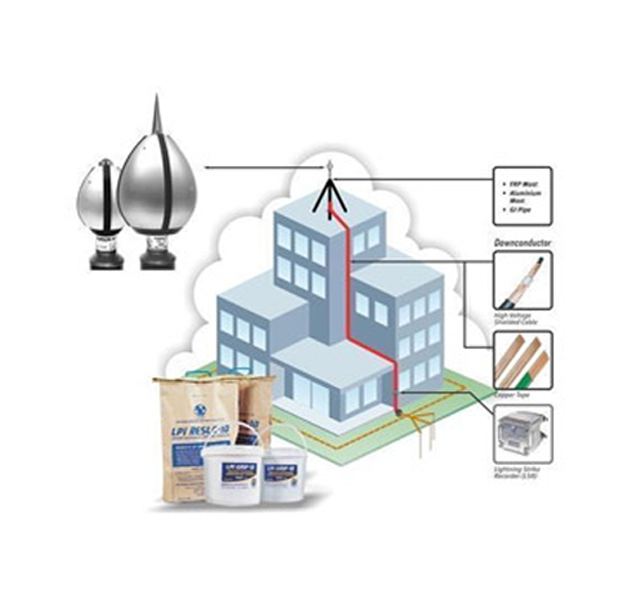Description
In normal conditions there is in the atmosphere a balance between positive and negative charges, where the ground is more negatively charged than the air and the elements placed on the ground. However, the formation of storm clouds creates a charge polarization: usually, the lower part of the cloud is charged negatively, inducing then a positive charge at the ground and other elements on it. The electric field at the atmosphere can reach then 10s of kilovolts. This positive charge becomes more evident at metallic elements, pointed objects and well-earthed objects, including trees. When the electric field is high enough, the cloud starts discharging towards the ground. The path formed by this discharge is called downward leader and produces a very sharp variation of the electric field, causing then corona effect.
One of these objects will be the one forming the upward leader, which will move towards the downward leader thus forming the discharge path between the cloud and the ground. This object will receive the lightning strike. The cloud charge will search the straightest path to earth. If this
path is not controlled, damages can be severe.
Electrical effects: Equipment destruction. Ground voltage rises and surges can damage all the equipment connected to the electrical network.
(1) Electro dynamical effects: Building damages. Conductors are submitted to mechanical strengths for being placed inside a magnetic field originated in another conductor. They may cause deformations and rupture.
(2) Thermal effects: Fires. Heat dissipation by Joule effect can even cause fires.
(3) Effects on living beings: Electrocutions and burns. Currents passing through during a short lapse are enough for electrocution risk by respiratory or cardiac arrest. Further burn risk appears.
(4) Induction effects: Within a variable electromagnetic field, induced currents appear in every conductor. If these conductors are connected to computers or other electronic equipment, damages can be severe. The consequences of all these effects are important economical losses because of the damages in buildings and equipment due to lightning strike or fires caused by a discharge.
Costs can be also very high if lightning causes service interruptions, stops production processes or forces to switch off and on again certain machinery if the control equipment is affected by lightning. Wave shape and currents for positive (ground to cloud) and negative (cloud to ground) discharges.
In normal conditions there is in the atmosphere a balance between positive and negative charges where the ground is more negatively charged than the air and other elements on the ground.
However, the formation of storm clouds creates a charge polarization: usually, the lower part of the cloud is charged negatively, inducing then a positive charge at the ground and other elements on it. The electric field at the atmosphere can then reach tens of kilovolts.
This positive charge is more evident at metallic elements, pointed objects and well-earthed objects, including trees.
When the electric field is high enough, the cloud starts discharging towards the ground. The path formed by this discharge is called the downward leader and produces a very sharp variation in
the electric field, causing the corona effect.
One of these objects will be the one forming the upward leader, which will move towards the downward leader thus forming the discharge path between the cloud and the ground. This object will receive the lightning strike. The cloud charge will find the most direct path to earth. If this path is not controlled, damages can be severe.

